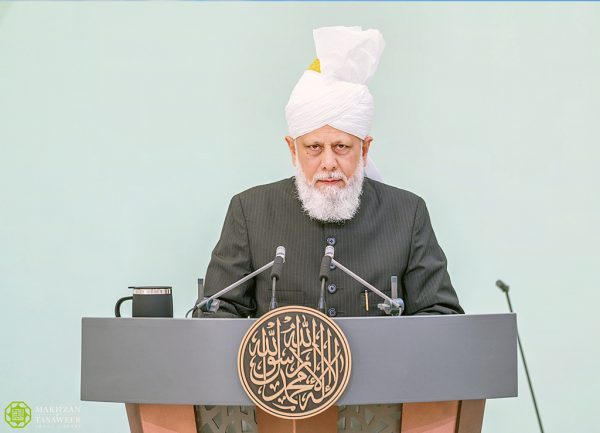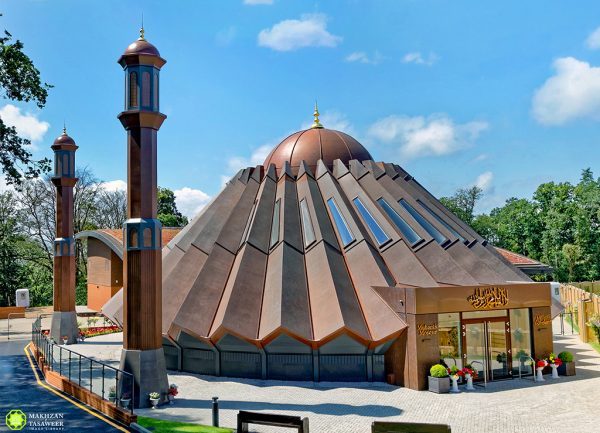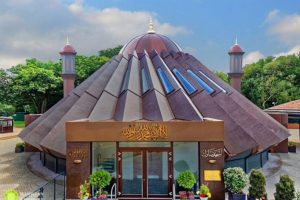After reciting Tashahhud, Ta‘awwuz and Surah al-Fatihah, His Holiness, Hazrat Mirza Masroor Ahmad (aba) said that he would continue mentioning the distribution of the spoils of war obtained from the Battle of Hunain.

His Holiness (aba) said that after the Battle of Hunain, the Holy Prophet (sa) instructed that all the spoils of war be gathered in Ji’ranah. Then, the Holy Prophet (sa) went to the Siege of Ta’if and then went to Ji’ranah after that. The Holy Prophet (sa) did not distribute the spoils right away upon reaching Ji’ranah; rather, the Holy Prophet (sa) waited for a few days, thinking that the Banu Hawazin might repent and their wealth would be returned to them. However, upon realising that they would not come, the Holy Prophet (sa) distributed the spoils of war.
The Banu Hawazin Accept Islam
His Holiness (aba) said that after the spoils of war were distributed, 14 eminent people from the Banu Hawazin who had accepted Islam went to the Holy Prophet (sa) and informed him that the entire tribe had accepted Islam and requested the Holy Prophet (sa) for mercy. The leader of this contingent made an appeal for mercy, saying that those who had been captured included the Holy Prophet’s (sa) relatives and those who had helped raise them. He said that because the Holy Prophet (sa) had spent his nursing years among the Banu Sa’d tribe, which was a branch of the Banu Hawazin. They then expressed their sentiments in poetry and passionate speeches. The Holy Prophet (sa) heard their heartfelt pleas and told them that he had been waiting for them for days, thinking that they would not come. He told them that most of the captives had been distributed, and so they could choose one of two things: the captives or wealth. The Banu Hawazin decided to take back the captives. The Holy Prophet (sa) said that all the captives who were a part of his share would be freed and returned to them, and he would speak to the Muslims about the captives who had already been distributed. The Holy Prophet (sa) also advised them to stand before the people after the afternoon prayer and declare the Holy Prophet (sa) as the intercessor on their behalf, requesting that the captives who had been distributed be released. Then, the Holy Prophet (sa) said he would suggest to the Muslims that they release the captives.
The Holy Prophet (sa) Returns the Captives to the Banu Hawazin
His Holiness (aba) said that this was the beautiful manner in which the Holy Prophet (sa) took care of the sentiments of both sides. Hence, the Banu Hawazin did what the Holy Prophet (sa) suggested, and after their plea, the Holy Prophet (sa) said that those who willingly wished to return the captives to the Banu Hawazin should do so, and anyone who wished something in return for doing so would be granted their request. The Muslims replied that for his sake, they would happily release the captives that had been distributed to them. This greatly pleased the Holy Prophet (sa), and thus, the great mercy of the Holy Prophet (sa) was yet again on display, as the Muslims were eager to return the captives without taking anything in return. Still, the Holy Prophet (sa) took care of the Muslims and said that six camels would be given in return for every freed captive. Furthermore, the Holy Prophet (sa) instructed that every freed captive should be given new clothes. Thus, 6,000 captives were returned to the Banu Hawazin.
Incident of Uyainah bin Hisn Refusing to Return His Captive
His Holiness (aba) said that there were a few who did not immediately agree to free the captives; however, when the Holy Prophet (sa) announced that six camels would be given for every freed slave, they ultimately agreed. Yet, Uyainah bin Hisn was still not in agreement and did not free the captive he had received. This ultimately led to him being deprived of blessings. The son of the captive Uyainah had approached him, asking for his mother’s freedom and even offering a hundred camels. Uyainah refused this offer, thinking that the son would then increase the amount. But Uyainah realised that the son was not returning, so he approached the son himself and asked if he would stand by his initial offer. However, now the son said that the offer was reduced to 50 camels, and as they continued speaking, the final offer came down to ten camels. At that point, Uyainah said that he should just take her for free. The son then said that the Holy Prophet (sa) had freed each slave with a new article of clothing. Hence, Uyainah had no choice but to give his own cloak. Upon this, the son told Uyainah that he had no wisdom or sense of taking advantage of an opportunity, and others also went on to ridicule Uyainah for the decisions he made, as he was ultimately left empty-handed.
A Once Staunch Enemy Accepts Islam
His Holiness (aba) said that the leader of the Banu Hawazin also accepted Islam. The Holy Prophet (sa) sent a message to him in Ta’if, saying that if he agreed to obey the Holy Prophet (sa), his captive family would be returned to him. The Holy Prophet (sa) ensured that they would not be distributed and arranged their accommodations in Makkah. Upon receiving this message, Malik bin Auf, the leader of the Banu Hawazin, immediately prepared to meet the Holy Prophet (sa) by night. He travelled to Ji’ranah, upon which his family was returned to him, and he was given a gift of a hundred camels. Upon seeing the kindness and generosity of the Holy Prophet (sa), he accepted Islam. This once staunch enemy of the Holy Prophet (sa) went on to become a sincere and loyal servant.
A Pleasant Reminder of the Holy Prophet’s (sa) Childhood
His Holiness (aba) said that amongst the captives was a woman named Shaimah. When she was captured, she told her captors that she was the Holy Prophet’s (sa) milk-sister; however, the companions did not believe her. They brought her to the Holy Prophet (sa) and she told the Holy Prophet (sa) that she was his milk-sister. The Holy Prophet (sa) asked if there was any proof of this. She showed him a bite mark and said that when he was an infant, he had bitten her as she held him in her lap. She reminded him of other things from his childhood, which he recognised. The Holy Prophet (sa) stood up, laid out his cloak for her to sit on and welcomed her. He had tears in his eyes as he asked about her parents, who had passed away. The Holy Prophet (sa) offered her the option to remain there or return to her people. She chose to return to her people, and the Holy Prophet (sa) instructed that she should be given three slaves, a bondswoman and two camels. He then offered to take her to Ji’ranah, where her people were residing. She also accepted Islam.
His Holiness (aba) said that when the Holy Prophet (sa) migrated from Makkah to Madinah, the Makkans had announced a bounty for anyone who brought him back dead or alive. Upon this, Suraqah tracked him down; however, God miraculously protected the Holy Prophet (sa). It was on this occasion that the Holy Prophet (sa) said to him, ‘How will you feel, O Suraqah, when the bangles of Chosroses will be on your wrists?’ At that moment, Suraqah also had a guarantee of security put in writing. The same Suraqah brought that very written guarantee to Ji’ranah, where he accepted Islam.
His Holiness (aba) said that Hazrat Umar (ra) approached the Holy Prophet (sa) and told him that during the time of ignorance, he had vowed to spend a period of devotion in the Sacred Mosque. The Holy Prophet (sa) instructed that he should uphold this oath and fulfil this period of devotion.
The Return Journey to Madinah
His Holiness (aba) said that the Holy Prophet (sa) set out for his return to Madinah on a Thursday with 12 days remaining in Dhu al-Qa’dah. The Holy Prophet (sa) took some animals along with him to distribute to people he met along the way. The Holy Prophet (sa) returned to Madinah after a nine-day journey, and a total absence from Madinah of two months and sixteen days.
Answer to the Allegations of Orientalists Against the Holy Prophet (sa)
His Holiness (aba) said that some orientalists raise allegations against the Conquest of Makkah, the Battle of Hunain and the Siege of Ta’if. For example, William Montgomery Watt says that only a few women were distributed to the eminent companions, while all other spoils and captives were kept in Ji’ranah. Sir William Muir says that only three women were given amongst Hazrat Ali (ra), Hazrat Uthman (ra), and Hazrat Umar (ra). He presents this as nothing but mischief and to raise allegations. It is recorded that there were 6,000 captives distributed all among the Muslims. However, when the chieftains of the tribe approached the Holy Prophet (sa), he announced to the Muslims to release the captives and that he would even give them something in return for doing so. Hence, established historic facts themselves refute the allegations made by Muir. In fact, Muir himself has also stated that all the captives from Hunain were released. Hence, his own statement refutes his allegation. Watt has also himself stated that it is possible that such allegations are fabricated.
His Holiness (aba) said that another allegation is raised by Margoliouth, who says that Malik bin Auf was forced into becoming a Muslim. However, this allegation is also completely false, and it is unfortunate that the Holy Prophet’s (sa) great mercy is twisted by some into coercion, something which is entirely baseless. History records that after returning all the captives to the Banu Hawazin, the Holy Prophet (sa) inquired about the chief of the Banu Hawazin, Malik bin Auf. In the same spirit of mercy, the Holy Prophet (sa) offered the freedom of his family and a gift of a hundred camels if he chose to accept Islam. Here, it is important to note that the Holy Prophet (sa) was the victor; he had the upper hand and would not receive any personal benefit from the acceptance of Malik bin Auf, nor was he responsible for Malik bin Auf. However, it was out of his mercy that he sent an invitation for him to accept Islam. History also shows that Malik had already been inclined towards Islam in his heart. Hence, he took the opportunity to accept Islam, and the Holy Prophet (sa) upheld his promise. Malik bin Auf also composed some poetry on that occasion, saying that never had he seen or heard about someone as great and esteemed as Muhammad (sa).
His Holiness (aba) said that this concluded the incidents pertaining to the Battle of Hunain. His Holiness (aba) said that he would mention further expeditions in the future.

Funeral Prayers
His Holiness (aba) said that he would lead the funeral prayer in absentia of the following:
Dr Laiq Ahmad Farrukh
Dr Laiq Ahmad Farrukh of Canada. He served for many years as a life-devotee in Africa. He is survived by his wife, a son and two daughters. He handled very difficult and complex medical cases in Ghana, and he conducted many successful operations, often against all odds, such as a case of strangulated hernia. His son says that he was quiet in nature, given to prayer, and lived a life of patience and steadfastness. He also served in The Gambia, where there were many difficulties, yet he continued his service without complaint. When the Fourth Caliph (rh) visited The Gambia, he also visited Dr Laiq’s home. Despite there not even being chairs to sit on in the home, the Fourth Caliph (rh) said that he would eat with him. Once, while in Lahore, Dr Laiq felt his blood pressure dropping and thought his demise was approaching. However, he heard a voice saying that it was not yet time, and that his time would come in Canada. This was fulfilled many years later.
His Holiness (aba) said that he too was in Ghana while Dr Laiq was serving there and observed him to be very kind, humble and given to service. He and his wife were very hospitable. He possessed many qualities which people often do not have. He did not care if it was night or day; rather, he was only concerned with helping people, and he did so without any modern luxuries. Rather, he would help and treat people under very strained circumstances. His Holiness (aba) prayed that may Allah grant him forgiveness and mercy, elevate his station, and keep his wife and children under His protection, granting them patience and forbearance.
Hameed Ahmad Ghauri
Hameed Ahmad Ghauri of Hyderabad, India. He is survived by his wife, a daughter and four sons, all of whom are serving the Community in some way. He was regular in offering prayers and keeping fasts. He performed Hajj and Umrah. He was obedient to Khilafat in all matters. He was at the forefront of offering financial sacrifices. He was very caring of his family and relatives. He had great respect for life-devotees. He served the Community at a local level in various capacities. His Holiness (aba) prayed that may Allah grant him forgiveness and mercy. His son, who is serving in Albania, could not attend his father’s funeral; may Allah grant him patience.
Summary prepared by The Review of Religions




Add Comment